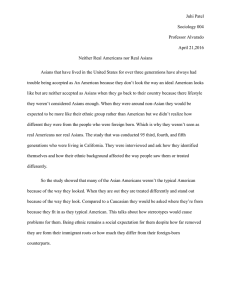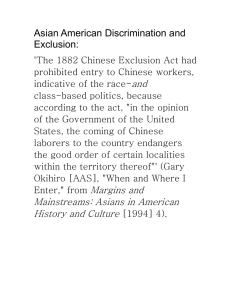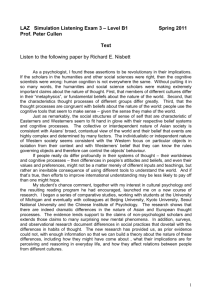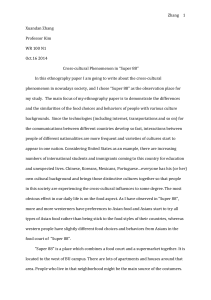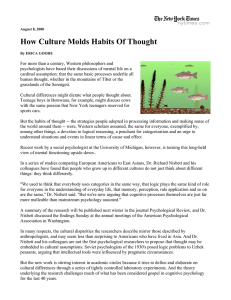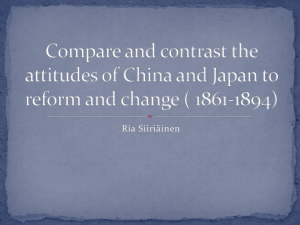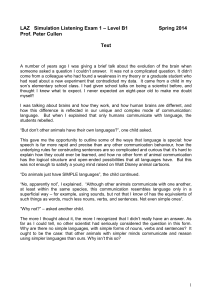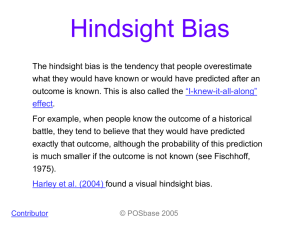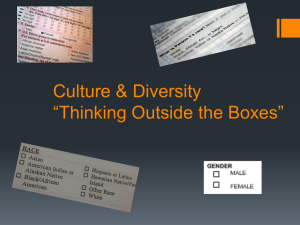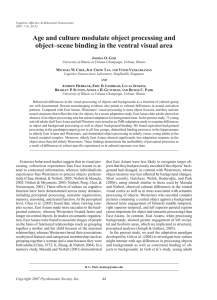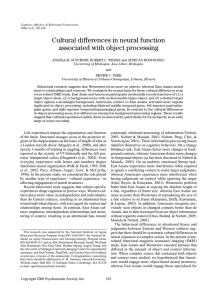B1 Simulation Listening Exam 4 05 2011
advertisement
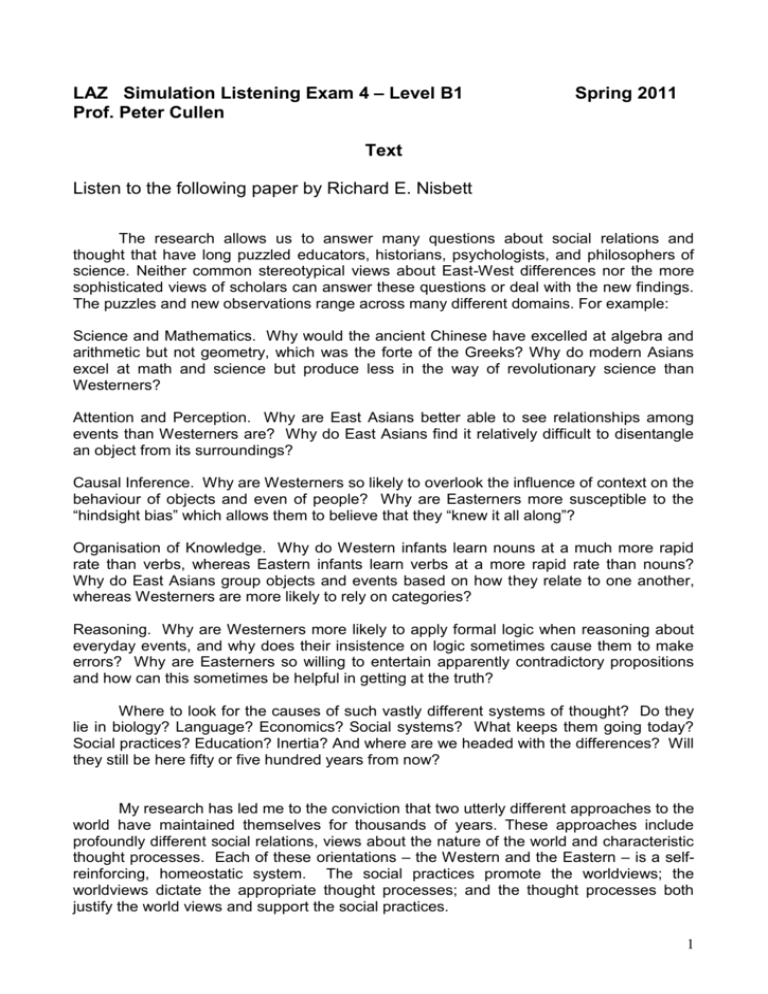
LAZ Simulation Listening Exam 4 – Level B1 Prof. Peter Cullen Spring 2011 Text Listen to the following paper by Richard E. Nisbett The research allows us to answer many questions about social relations and thought that have long puzzled educators, historians, psychologists, and philosophers of science. Neither common stereotypical views about East-West differences nor the more sophisticated views of scholars can answer these questions or deal with the new findings. The puzzles and new observations range across many different domains. For example: Science and Mathematics. Why would the ancient Chinese have excelled at algebra and arithmetic but not geometry, which was the forte of the Greeks? Why do modern Asians excel at math and science but produce less in the way of revolutionary science than Westerners? Attention and Perception. Why are East Asians better able to see relationships among events than Westerners are? Why do East Asians find it relatively difficult to disentangle an object from its surroundings? Causal Inference. Why are Westerners so likely to overlook the influence of context on the behaviour of objects and even of people? Why are Easterners more susceptible to the “hindsight bias” which allows them to believe that they “knew it all along”? Organisation of Knowledge. Why do Western infants learn nouns at a much more rapid rate than verbs, whereas Eastern infants learn verbs at a more rapid rate than nouns? Why do East Asians group objects and events based on how they relate to one another, whereas Westerners are more likely to rely on categories? Reasoning. Why are Westerners more likely to apply formal logic when reasoning about everyday events, and why does their insistence on logic sometimes cause them to make errors? Why are Easterners so willing to entertain apparently contradictory propositions and how can this sometimes be helpful in getting at the truth? Where to look for the causes of such vastly different systems of thought? Do they lie in biology? Language? Economics? Social systems? What keeps them going today? Social practices? Education? Inertia? And where are we headed with the differences? Will they still be here fifty or five hundred years from now? My research has led me to the conviction that two utterly different approaches to the world have maintained themselves for thousands of years. These approaches include profoundly different social relations, views about the nature of the world and characteristic thought processes. Each of these orientations – the Western and the Eastern – is a selfreinforcing, homeostatic system. The social practices promote the worldviews; the worldviews dictate the appropriate thought processes; and the thought processes both justify the world views and support the social practices. 1 LAZ Simulation Listening Exam 4 – Level B1 Spring 2011 ______/30 Prof. Peter Cullen ___________________________________________ Name, Date, and Registration Number Questions: You do not have to use complete sentences! This is a listening exam. SIMPLE AND CORRECT IS BETTER THAN COMPLICATED AND WRONG. 1. Who has been puzzled by social relations? 2. Generally, how do Asians perform in the sciences? 3. What is the “hindsight bias”? 4. How do east Asians group objects and events? 1. What has Nisbett’s research lead him to be convinced of? ______/20 True or False: Write “True” or “False” in the space next to each statement 1. Scholarly views are sophisticated. ________________ 2. The Greeks were good at algebra. ________________ 3. Western infants learn verbs more quickly than nouns. ________________ 4. Western logic never causes errors of judgement. ________________ 5. Cultural orientations are homeopathic systems. ________________ ______/10 2 LAZ Simulation Listening Exam 4 – Level B1 Prof. Peter Cullen Spring 2011 Answer Sheet 1. Who has been puzzled by social relations? educators, historians, psychologists, and philosophers of science. 2. Generally, how do Asians perform in the sciences? excel at math and science but produce less in the way of revolutionary science than Westerners 3. What is the “hindsight bias”? which allows them to believe that they “knew it all along” 4. How do east Asians group objects and events? do East Asians group objects and events based on how they relate to one another 5. What has Nisbett’s research lead him to be convinced of? conviction that two utterly different approaches to the world have maintained themselves for thousands of years True or False: Write “True” or “False” in the space next to each statement 1 2 3 4 5 T F F F F 3
